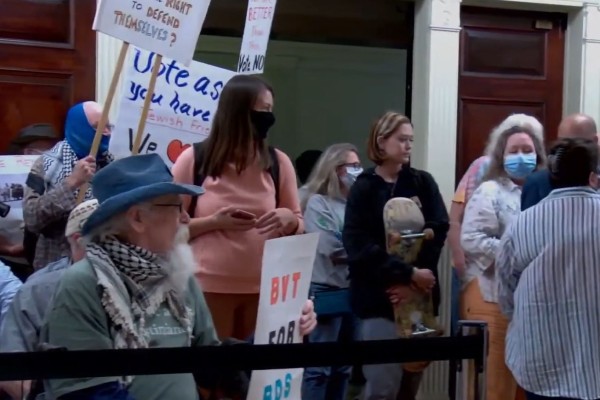Resolution sent back to the Racial Equity, Inclusion and Belonging Committee after heated town hall meeting.
By Pesach Benson, United With Israel
A Burlington, Vermont city council vote to endorse the Boycott, Divestment and Sanctions campaign against Israel was scrapped at the last moment when the resolution’s sponsor withdrew it on Monday. Council member Ali Dieng said he was concerned the resolution would promote anti-Semitism.
The move came after the council spent hours listening to impassioned public comments for and against BDS.
At Dieng’s suggestion, the council voted 6-5 to send the resolution back to the Racial Equity, Inclusion and Belonging Committee for further discussion. The council members voting against wanted to kill the resolution right then and there.
Local reports described a bellicose scene in the council chamber and on the street outside: demonstrators holding signs with slogans such as “U.S. Taxpayers Finance Apartheid,” activists trying to shout each other down, and a crowd that was at times shoulder-to-shoulder.
Dieng told the Jewish Telegraphic Agency that he changed his mind about the resolution after hearing local Jews’ concern that it would help fuel anti-Semitism.
“A lot of community members who are Jewish have been experiencing anti-Semitism for a very long time and I didn’t know about it,” Dieng told the JTA. “We are a small community, and I want to make sure everyone feels safe. Many people [who supported the resolution] are not happy with me, but I think it is the right thing.”
Around 20,000 Jews live in Vermont, mostly in Burlington, the state’s largest city.
“The only national student-led Jewish organization in this country, called Jewish on Campus, has already recorded a spike in anti-Semitic incidents are [sic] the University of Vermont in the past week,” a University of Vermont student told the local Channel 5 News.
Dieng also conceded that the council should give its attention to local issues without the distraction of international politics. “My focus as an elected official should be on here first,” he told the JTA.
Although the resolution was non-binding, becoming the first U.S. city to endorse BDS would have had a powerful symbolic effect. The resolution cited human rights organizations who “independently concluded Israel is guilty of the crime of apartheid,” and labeled Jewish settlements in Judea and Samaria as “illegal.”
The resolution’s demands on Israel included “ending the military occupation and colonization of all Arab lands” and allowing Palestinian refugees to return to their former homes in Israel.
Even if the council had passed the resolution, it would have been likely vetoed by Mayor Miro Weinberger, who is Jewish. In a statement, the mayor called BDS “divisive” and deplored the resolution’s timing.
“Specifically, I oppose the boycott, divestment, and sanctions (BDS) movement that seeks to weaken and delegitimize an important and long-standing partner of the United States, the democratic State of Israel,” the mayor said.
“Further, I find the Resolution as it is written to be an inappropriate and counterproductive declaration for our local legislative body, and find it very unfortunate that the sponsors have brought it forward during Rosh Hashanah and Yom Kippur, the holiest days of the year for our Jewish residents who are engaged in worship and acts of charity,” Weinberger added. “I urge the Council to reject this Resolution outright and make clear that Burlington does not support the divisive BDS movement.”
Vermont became an unlikely BDS flashpoint in July when the Ben & Jerry’s board of directors sought to boycott Israel. The ice cream maker’s London-based parent company Unilever intervened, and the Ben & Jerry’s board is instead boycotting sales of its products in Judea and Samaria.
Because the Israeli distributor, Avi Zinger, is not complying with that boycott, the board said it would not renew its contract with Zinger when it expires.
More than 30 U.S. states have laws against BDS, though Vermont is not one of them. Most recently, Arizona state treasurer Kimberley Yee notified Unilever that the divestment of $143 million in the conglomerate would be completed by Sept. 21.
